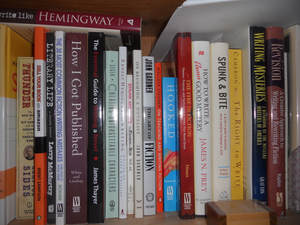 A significant milestone was reached yesterday—I submitted my final draft of my new book, The King of Trash, to my editor. Unfortunately, I had already sent him a final draft on November 1st, preceded by a different final draft on October 1st, which was preceded by a different final draft I sent on September 8th. I must be confused about what “final” means. Fortunately for me, since September, my editor has been through a couple of eye surgeries, a computer disaster, and had a couple of books to edit before he was ready for mine. Knowing this, I took advantage of the opportunity, each time, to go through my book again. During this last rewrite of my book, done during the last two weeks, I deleted 3,000 words, added 500, and made another hundred or so small changes. Wait a minute. How could the others have been “final” drafts if I found so much wrong with this last one? Frankly, I don’t understand either. I saw things to be changed this last time that I hadn’t seen in my other drafts, or maybe I wanted to change the order of the scenes, or maybe I heard different music this time, or saw a new way of developing the dialogue, or that I read the story more as a reader than as a writer. I am, without question, an iterative person and I’ve written a previous blog about how I can never stop working on a story. I’m just confirming that it’s happening with this one, too. I have a good editor and he’s tolerant of me, but there is a point at which he and I both know that I have to quit rewriting the book. I don’t want to submit anything less than what I think is my best effort, and he doesn’t want me to, but that’s reveals the problem: I can’t tell when my manuscript represents my best effort. Obviously, my intuition hasn’t served me well or else I wouldn’t have sent him four iterations on a final draft. It could be that I don’t know how to tell this particular story, yet. Maybe I need to stop thinking in terms of final drafts and just put the manuscript away for a while, come back to it later. Stephen King recommends six months. That’s a little long for me, but I appreciate the idea of gaining perspective. Not thinking about a story for a week or two can do wonders for seeing things from a different perspective. It may also be my obsessive nature of not being able to quit messing with the words. I have promised my editor that once I submit what I think is a final draft, then I won’t change it anymore. The reason for this is obvious. My editor will be doing a line-by-line edit, which means that he works at the word and sentence and paragraph level, and it will take him weeks to do a whole manuscript. When he makes a correction, or rearranges a sentence or paragraph, or repairs either bad grammar or poor sentences, then he expects that what he’s done is pretty much it. I have the right to review it and either accept what he’s done or suggest something different, but it’s bad manners to waste his time. For him to work on a paragraph to make it sound really good, and then for me to want to delete it, is going to irritate him and rightly so. With regard to this particular story, I’ve been lucky that he was preoccupied with other things and had not started on my manuscript. I had the opportunity to rework it before he was ready to begin his editing process. This is one of the cardinal rules of working with an editor: the writer has to accept that he has to, at some point, quit writing.
2 Comments
DKB
11/12/2018 03:43:05 pm
I once had an art teacher leap over a table and scream, "STOP, don't do a single thing more. It's finished." So I had to trust her to acknowledge the painting was complete.
Reply
DGB
11/12/2018 04:04:00 pm
I see as a sculptor would when I make reeds. One can see at the beginning that there is too MUCH THERE there, and begin to remove it. There is a point of no return. If the sculptor slips and scrapes off the nose, the sculpture is ruined. If I scrape my reed too much in the wrong places, then it will NEVER play well.
Reply
Leave a Reply. |
AuthorDon Willerton has been a reader all his life and yearns to write words like the authors he has read. He's working hard at it and invites others to share their experiences. |

 RSS Feed
RSS Feed